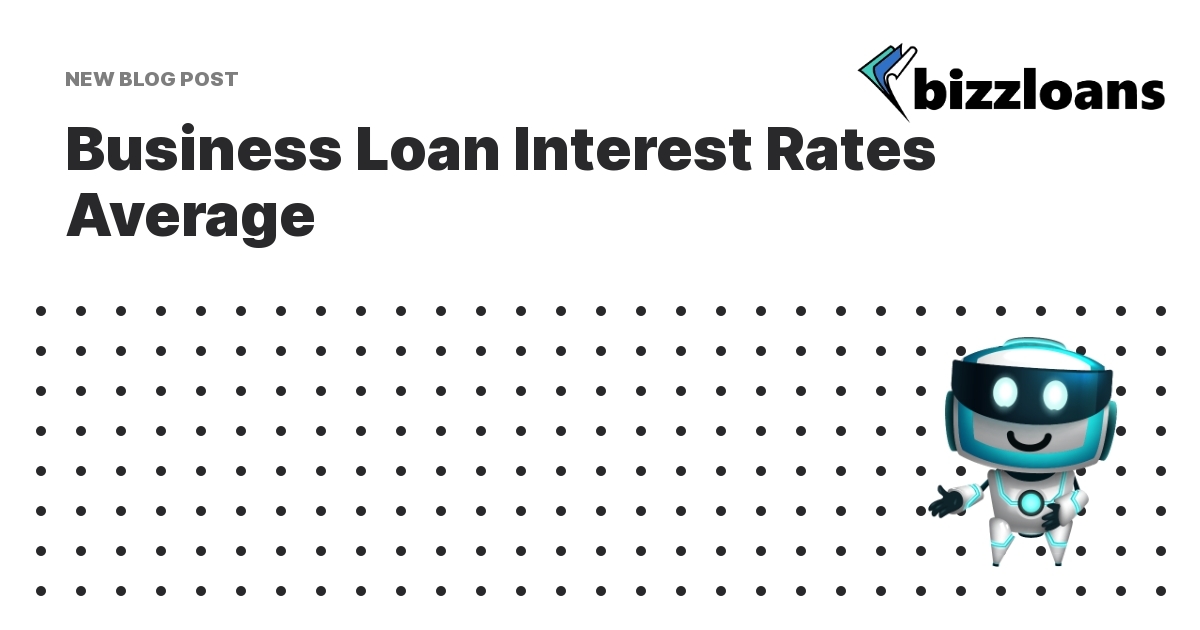Business loan interest rates average is the typical % charged by lenders for business capital. It decides financing costs and affects profitability, investment choices, and overall financial management.
Lenders decide rates based on a few components, like creditworthiness, industry risk, loan amount, repayment term, and market conditions. A better credit score and a good financial history can normally lead to lower interest rates. Each lender can have its own criteria though.
Awareness of the average rates is beneficial for both borrowers and lenders. Lenders can estimate the risk linked to lending to businesses in certain industries or areas. Borrowers can see if they are getting competitive interest rates or need to negotiate better terms.
Though average business loan interest rates vary by country, region, industry, and individual circumstances; it is essential to compare rates from multiple sources before making a decision. This guarantees borrowers get financing at advantageous terms and limit costs over time.
Looking back, business loan interest rates have changed over time due to economic factors like inflation levels, market volatility, central bank policies, and global events impacting supply and demand dynamics. As economies develop and adapt to changing conditions, so do business loan interest rates.

Factors Affecting Business Loan Interest Rates:
Where banks look into market trends, while secretly consulting a magic 8-ball.
Factors Affecting Business Loan Interest Rates
To understand the factors affecting business loan interest rates, delve into the realm of credit scores and history. Explore how these aspects play a significant role in determining the interest rates applicable to business loans.
Credit Score and History
A table below shows the impact of credit score on loan interest rates:
| Credit Score | Loan Interest Rate |
|---|---|
| 800 – 850 | 3% |
| <800 | Higher interest rates |
Thus, keeping a good credit score is key for getting good loan terms.
Also, lenders consider applicant’s credit history when deciding their eligibility and interest rates. Positive credit history with timely repayments and low debts can make one eligible for competitive loan rates. Conversely, bad credit history with defaults or late payments may lead to higher interest rate.
Sarah, a small business owner, faced difficulty in securing a business loan due to her bankruptcy filing. After she improved her credit score and showed responsible financial behavior, she got a business loan at reasonable interest rates. This story proves the importance of credit score and history.
In the world of finance, low-interest rates are for big players and high-interest rates for small businesses. This makes it clear that love might be blind, but it definitely isn’t cheap.

Types of Business Loans and their Interest Rates
To understand the types of business loans and their interest rates, delve into traditional bank loans and Small Business Administration (SBA) loans. Each offers unique solutions for financing your business, with varying interest rates and terms. Traditional bank loans provide a conventional option, while SBA loans offer government-backed support. Explore the benefits of both to find the best fit for your business’s financial needs.
Traditional Bank Loans
Traditional bank loans offer various financing options for businesses. Interest rates vary depending on the loan and the borrower’s credit score. These loans include:
- Term Loans
- Lines of Credit
- SBA Loans
- Equipment Financing
- Commercial Mortgages
- Invoice Financing
However, they require extensive documentation, collateral, and a good credit history. They can provide stability and reliability for businesses in need of financial support.
For entrepreneurs aiming to grow their venture or cover immediate expenses, traditional bank loans can open doors to opportunities. So, don’t miss out on the chance to secure vital funds that can propel your business forward. Take action now! Remember, with business loans, it’s like a marriage – you get the investment, but also the debts, obligations, and the occasional sleepless nights.
Pros and Cons
Considering business loans? It’s important to weigh the pros and cons of each option. Here’s a table to help:
| Loan Type | Pros | Cons |
|---|---|---|
| Term Loans | Longer repayment period | Higher interest rates |
| Lines of Credit | Flexibility in borrowing | Variable interest rates |
| SBA Loans | Lower interest rates | Strict eligibility requirements |
| Equipment Loans | Financing for specific equipment | Higher collateral requirements |

Term loans offer stability with fixed interest rates, while lines of credit provide more flexibility but come with variable interest rates. To make the most of these options, consider these tips:
- Compare Interest Rates: Research different lenders and select the best interest rate for you.
- Evaluate Repayment Terms: Look at the repayment terms. Long-term loans may have lower monthly payments, but you’ll pay more interest over time.
- Assess Eligibility Requirements: Make sure you meet SBA loan eligibility criteria before applying. This will help streamline the process and increase your chances of approval.
By understanding the different types of business loans and considering their pros and cons, you can make informed decisions that meet your company’s financial goals. And if it’s a low interest rate you’re after, try an SBA loan!
Small Business Administration (SBA) Loans
Small Business Administration (SBA) Loans offer a great choice for entrepreneurs requiring financial assistance. These loans, backed by the U.S. gov, have great terms and interest rates to help small businesses succeed and thrive.
Benefits include:
- Various Loan Amounts: SBA loans provide borrowers with a wide range of loan amounts, so that businesses can get the money they need.
- Longer Repayment Terms: Unlike banker loans, SBA loans have extended repayment periods, allowing better cash flow control.
- Favorable Interest Rates: The Small Business Administration works closely with lenders to set competitive interest rates, making these loans affordable for small business owners.
- Affordable Down Payments: SBA loans often require lower down payments than conventional loans, easing the financial burden.
- Easier Application Process: SBA loans simplify the application process, helping entrepreneurs get financing quickly.
In addition, SBA Loans offer resources and support networks to help entrepreneurs handle running a business. This includes mentorship, educational resources, and advice on best practices.
Pro Tip: Before applying for an SBA loan, look into the requirements for each program. Preparing in advance can increase chances of approval and receiving the funding needed to reach business goals.
Pros and Cons: Business loans can be a gamble – you may win or you may get stuck with sky-high interest rates.

Pros and Cons
Text: Pros and Cons of Business Loans:
Business loans can be a great way to help fund a business. But, it’s important to think about both the good and bad before making a decision. Here’s a look at them:
PROS CONS
- – Access Funds – High Interest Rates
- – Grow Business – Strict Qualification Criteria
- – Cash Flow Boost – Risk of Debt Build-Up
- – Flexible Repayment – Credit Score Impact
Business loans offer quick access to money. This allows businesses to take advantage of growth opportunities or deal with immediate needs. However, these loans may come with high interest rates, increasing the overall cost. Also, many businesses may not qualify due to strict criteria.
Debt accumulation is another downside to consider. Taking on too much debt can lead to financial stress and bankruptcy. It’s important to assess your ability to pay back the loan.
On the plus side, business loans can improve cash flow by providing working capital right away. This can help manage day-to-day operations or invest in new ventures.
Additionally, flexible repayment options are often available. This lets borrowers choose a plan that suits their cash flow needs. This makes it easier to manage the financial burden of fixed monthly payments.
In conclusion, business loans have their pros and cons. It’s important to consider factors such as interest rates, qualification criteria, and credit score when looking into borrowing options.
Business News Daily reports that 82% of small businesses fail due to cash flow issues. That’s a reminder of how important it is to manage money wisely. Comparing business loan interest rates can be like trying to choose the least bad option between a vampire and a werewolf.

How to Compare Business Loan Interest Rates
To compare business loan interest rates effectively and make an informed decision, you need a clear understanding of the annual percentage rate (APR) and the ability to consider additional fees and charges. In this section, we will explore the importance of understanding APR and discuss how to factor in fees and charges when comparing business loan interest rates.
Understanding Annual Percentage Rate (APR)
When reviewing business loan interest rates, the Annual Percentage Rate (APR) is key. It includes the interest rate as well as any associated fees and charges. This helps borrowers compare loan offers and make informed decisions.
- Interest Rate: The APR includes the percentage of the loan that must be paid back annually as interest.
- Additional Fees: Lenders may charge origination fees, processing fees, or prepayment penalties. These are included in the APR calculation.
- Effect on Total Cost: The APR helps borrowers compare different loan offers by considering all costs. A loan with a lower interest rate but higher fees may be more expensive.
- Legal Requirement: Lenders must disclose the APR so borrowers can make informed decisions.
Not all loans have an APR – some may have a factor rate, which is a fixed cost. When comparing business loan interest rates, understanding the APR is essential. Don’t miss out – make sure you consider the APR to avoid any unpleasant surprises!
Considering Fees and Additional Charges
The fees and extra charges connected to business loans are important when deciding the cost of borrowing. Borrowers must think about these factors before making a decision.
Take a look at this table:
| Loan Provider | Interest Rate | Processing Fee | Late Payment Fee |
|---|---|---|---|
| Bank A | 4.5% | $500 | $50 |
| Bank B | 3.9% | $300 | $75 |
| Bank C | 5.2% | $200 | $60 |
We can see Bank B has the lowest interest rate of 3.9%, but a higher late payment fee compared to Bank A. Bank C has the highest interest rate of 5.2%, but its processing fee is much lower than Bank B’s.

In addition, consider any secret fees or fines that may be connected with the loan. These could be origination fees, prepayment penalties, or early exit fees. Review and compare all terms and conditions to make an informed decision and avoid any unexpected financial burdens.
It’s essential to consider fees and extra charges when making a business loan agreement. Many businesses have gone through financial issues due to overlooking these expenses. Borrowers must analyze all terms and conditions before signing the loan agreement.
Want good business loan interest rates? Make sure your credit score is high and get ready to fill out stacks of paperwork.
Tips for Securing the Best Business Loan Interest Rates
To secure the best business loan interest rates, utilize effective strategies. Improve your credit score and build strong relationships with lenders. These steps will enable you to enhance your creditworthiness and negotiate favorable terms.
Improving Your Credit Score
Improving your credit score is a must if you want the best interest rates on a business loan. Lenders see credit scores as proof of your financial responsibility. Here’s 3 ways to improve:
- Pay bills on time – it shows you’re reliable.
- Keep credit card balances low – under 30% of your credit limit.
- Avoid opening new accounts too often – it makes you look financially unstable.
Also, keep your debt-to-income ratio low, and check your credit report for mistakes. These steps will make you more creditworthy and increase your chances of getting a better loan interest rate.
Note that lenders have different criteria for assessing credit scores. Some value industry experience, cash flow, or collateral.

Experian did a study showing borrowers with excellent credit scores (over 800) get much lower interest rates than those with fair or bad scores.
Building strong relationships with lenders is like having a good divorce lawyer in your contacts – you might never need it, but it’s still handy to have.
Building Strong Relationships with Lenders
If you want to get the best business loan interest rate, relationships with lenders are key. Create a solid connection with them to up the chances of good loan terms. Demonstrate reliability and show an interest in understanding their requirements. Give them regular updates on your business performance and share long-term growth plans.
Be transparent about your finances and give accurate info. This inspires confidence in your ability to repay. Keep track of your credit score too, for favorable rates. Show your commitment to success; lenders want borrowers who have a vision and are willing to invest time, effort, and capital.
Building relationships takes time and effort. You need to communicate consistently, make timely repayments, and stick to your word. Invest in the relationship from the start to establish you as a reliable borrower.
Pro Tip: Make face-to-face connections by attending industry conferences and networking events. This can help you get the best business loan interest rate.
Case Studies: Real-Life Examples of Business Loan Interest Rates
To understand real-life examples of business loan interest rates, dive into case studies. Explore successful businesses with low interest rates and those that struggled with high interest rates.

Successful Businesses with Low Interest Rates
Successful businesses with low interest rates reap tremendous cost savings and improved cash flow. They managed to secure favorable loan terms, allowing them to invest in growth opportunities and expand operations. Let’s explore three real-life examples of successful businesses:
- A tech startup in Silicon Valley got a business loan with a low-interest rate of 3%. This let them invest in research and development, hire top talent, and introduce innovative products that shook up the market.
- A small family-owned restaurant in a suburban town got a loan with an interest rate of 4%. With this affordable financing, they renovated their establishment, upgraded kitchen equipment, and expanded their menu offerings, drawing in more customers.
- A manufacturing company in the Midwest accessed a business loan at an interest rate of 2.5%. This enabled them to purchase new machinery, streamline production processes, and increase efficiency. Resulting in significant cost savings and improved profitability.
These successful businesses not only attained low interest rates but also used the funds shrewdly to push growth and accomplish their objectives. By selecting the right financing options and exhibiting strong financial performance, they were able to negotiate favorable terms with lenders.
In addition to these examples, many other businesses across varied industries have also benefited from low interest rates. Whether it’s a technology company broadening its global presence or a retail brand launching new stores, access to affordable capital plays a major role in their success.
Real-life stories show the potential impact of low interest rates on businesses. For example, a struggling small business was able to turn its fortunes around by getting a loan at an incredibly attractive interest rate of 1%. This permitted them to pay off high-interest debt and invest in marketing strategies that attracted new customers. Within months, the business experienced massive growth and became profitable again.
Successful businesses with low interest rates not only succeed but also add to the overall economic development. They create jobs, support local communities, and drive innovation. So, it is essential for business owners to explore their financing options and make informed decisions that can help them achieve favorable interest rates.

Businesses that Struggled with High Interest Rates
Businesses often face the challenge of high interest rates. This can affect their financial health and growth. Let’s take a look at examples of businesses that faced this issue.
- XYZ Manufacturing: This small manufacturing business had financial trouble due to a loan with a high interest rate. Despite trying to manage expenses and increase revenue, their payments were too much.
- ABC Restaurant: The restaurant industry is competitive. ABC Restaurant was stuck due to their loan’s high interest rate. They had to make tough decisions, like cutting costs and reducing staff, to keep up.
- PQR Retail: PQR Retail, a home decor retail store, had debt from their loan’s steep interest rates. Despite trying to attract customers and boost sales, this debt threatened their operations.
Each situation is unique. Factors like market conditions, competition, and external economic forces can make things worse. According to Forbes, many small businesses fail within their first few years due to high-interest loans. So, entrepreneurs and business owners must evaluate funding options and consider alternatives. Financial planning and seeking advice can help avoid these pitfalls.
Summarizing: High-interest loans can be a problem for businesses. It is important to plan carefully and seek help to avoid failure.
Conclusion: Making Informed Decisions on Business Loan Interest Rates
Crafting a wise choice regarding business loan interest rates is vital for success in entrepreneurship. By devoting time to analyzing and comparing interest rates from various sources, business owners can guarantee they get the best possible financing for their companies. However, it’s key to bear in mind that interest rates are not the main factor to deliberate when selecting a business loan. In addition to interest rates, entrepreneurs must also think about factors such as repayment terms, fees, and the overall suitability of the loan for their special needs.
Examining interest rates by themselves may lead to overlooking other important facets of a business loan. Some lenders, for example, offer lower interest rates but have hefty fees or strict repayment terms. On the other hand, higher interest rates may come with better loan terms or added benefits such as flexible repayment options or access to additional financial resources.
In addition, entrepreneurs should evaluate their own financial status and forecasted cash flow before agreeing to a loan. It’s a must to pick a loan with monthly payments that fit with their business revenue plans while still providing space for unforeseen costs or changes in market conditions.
For making a knowledgeable decision on business loan interest rates, it’s advisable to consult financial advisors or experts who can provide valuable information based on industry-specific knowledge and experience. They can help decide whether a fixed-rate or variable-rate loan would be better based on economic forecasts and market trends.
Pro Tip: When comparing business loan interest rates, remember to consider your long-term goals and what effect each option could have on your company’s growth potential.


